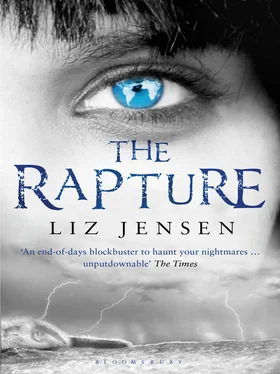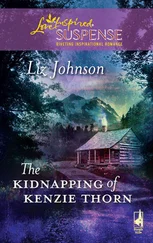At last the door bursts open and six psychiatric nurses pour in: four men and two women, all built like tanks. They swarm on to her and pin her to the floor while Rafik stands back, rubbing his wrist in pain.
‘Little bitch bit me,’ he mutters, wiping at the blood.
‘I think we’ll call it a day now, Bethany,’ I breathe, trying to make sure the sob that’s hatching in my throat doesn’t make it to the surface. ‘I’ll see you next time.’
She seems to find this, or something else, unaccountably funny. In any case as I leave the room she laughs and laughs, like the horrible, crazy little girl she is.
Suppression is easily done. It’s a simple matter of choice. My decision to forget what Bethany said — about things she can’t possibly know — is a judgment call. I’m fully aware of what I am doing. In the time it takes to hurtle up the corridor to the lift, I have flung the moment from my mind and from my life, like toxic waste down a chute.
My new home is minimalist. Things like nice cushions once mattered to me. Cushions that match your sofa, and perhaps also your curtains, cushions that end up on the floor when you and a certain poker player are doing the deed, with abandon, in front of a winter fire. But since my world got recalibrated overnight, I’ve stopped caring about interior decoration, and my only cushion-related concern is the quality of the gel pad I sit on to prevent pressure sores. Domestically speaking, my issues are ramps and wheel-in showers and worktops at the right level, and how to apply to the council to get further innovations installed at no cost. Thanks to someone else’s misfortune, I have managed to acquire, at short notice, a self-contained ground-floor flat in Hadport that is already wheelchair-adapted. I’m aware that this represents a kind of jackpot in the disability world, and feel duly grateful. I feel other, less comfortable things too. The previous occupant, a young tetraplegic called Mikey, succumbed, suddenly, to ‘complications’. His family’s loss has become my gain. The flat was advertised by the owner, Mrs Zarnac, on a spinal injury website. I’m not superstitious. But I’ve made a point of not enquiring further about Mikey’s complications, or asking in which room he died, or how many hours passed before his carer found him.
It’s a ground-floor flat in the old part of Hadport. I don’t see much of Mrs Zarnac, who lives upstairs. Lonely-looking older men visit her, and when she cooks for them, vinegar smells waft down. It crosses my mind she might be pickling them alive, one after another, for some dark embalming project. In a spirit of defiance and also as a perverse comfort, I have acquired a Frida Kahlo print which leans against one wall because I can’t reach to hang it up. Autorretrato con Collar de Espinas : Self-Portrait with Necklace of Thorns. Against a backdrop of jungle leaves, Kahlo gazes blankly out from beneath the single eyebrow which, for aesthetically unfathomable reasons, she refused to pluck into a conventional twosome. It’s a head-and-shoulders portrait, so you don’t see her wheelchair. At her left shoulder is a black cat, eyes wild, ears cocked back, positioning itself to pounce on a dead hummingbird which hangs, wings outstretched, from a mesh of thorns around her neck. In Mexican folklore, the bird is meant to bring good luck or love. To her right, preoccupied with something in his hands, is her pet monkey, a present from her pathologically unfaithful husband, Diego. The same folklore says this creature is a symbol of the Devil. Two dragonflies and two butterflies dance above her head. I assume they represent the imagination, and the freedom it offers. Often I’ll lie on my bed, trying to psychoanalyse the passionate and deranged Frida, forced to turn herself into a shrine to pain. She painted her own complex torture again and again, obsessively, in different guises, many macabre: the artist hooked to machinery, pierced by nails, surrounded by foetuses in jars, trussed into a surgical corset, as an antlered deer stuck through with arrows. She’s an appalling role model. I am a Petri dish of nascent manias, many no doubt as poisonous as those that swarmed in Kahlo’s head. The notion that medical technology will evolve, and I’ll walk again in some state-of-the-art, semi-bionic way: I’ll spend hours finessing that one.
But the fact is there are still times when I just want to die.
I have another Kahlo reproduction, which hangs in my hallway: Cuando te tengo a ti Vida, Cuanto te Quiera . Its title means, When I Have You, Life, How Much I Love You. This being too schmaltzy a sentiment to articulate aloud in English, even to myself (my inner cynic balks), I nevertheless find myself rolling the Spanish words around my mouth and finding them, with the distance of foreignness, a comfort. Cuando te tengo a ti vida, cuanto te quiera. Watching TV puts your own hell in a different perspective, if that’s what you want. Today I do.
I make coffee, with which I permit myself four squares of dark chocolate, transfer to the sofa, flick through the movies on offer, hesitate between a documentary about famine and Whatever Happened to Baby Jane? , and end up plumping for the news. Two more suicide bombings in Jerusalem. Abductions, limbs lost, children orphaned. Black-clad women wailing their grief in Iran. The row about Chinese and American greenhouse gas emissions has ratcheted up a notch, while the heatwave has spread to the whole of Europe, felling old people in precise strokes, like an efficient industry. The morgues are, in the reporter’s phrase, ‘bursting at the seams’. Spain, France and Italy are the worst affected.
Or the lucky ones, according to a spokesman for one of the Planetarian-inspired eco-groups that sprouted after the Copenhagen climate summit failed to deliver. After he retired and spent more time with his periodicals, my father developed a habit of referring to our era as ‘the Age of Dogma’. He used the growth of the Planetarian movement to prove his point: he saw it like the Faith Wave, as another example of how like the weather, the moral debate and its proponents had become more extreme, self-righteous and fanatical. Then his brain turned to Emmental and I heard no more from him on the subject. Which was a shame because he would have had interesting things to say about its more recent manifestations. ‘These are natural, organic losses,’ the spokesman says reassuringly. Although he’s a radical, he talks in pastel, like the kind of low-key but efficient salesman who, when selling you a product, makes sure to tell you that he owns one himself, and that he is more than satisfied with it. ‘Human culls are not a new phenomenon,’ he says. ‘Desperately sad though it is for the families of those elderly people affected, I think there are positive aspects to these deaths, which we have a responsibility to assess.’
‘Would you also like to see a zero birth-rate, to follow that argument to its logical conclusion? As advocated by thinkers like Harish Modak?’ asks the interviewer. I have heard of Modak, seen his photo: a strong-faced, elderly Indian with hooded eyes. His name crops up constantly in eco-debates and he has inspired a thousand survivalist settlements worldwide. A prophet of doom, is the general consensus in the British tabloid press: a fun-killer, an eco-bogeyman.
‘Of course. As would any rational person who’d like to help ensure minimal human suffering in decades to come. You’ll find there’s a groundswell of opinion. The times are changing and we’re changing with them. Adapting. As we’ve always done. But personally I’m prepared to take the argument further than Harish Modak does, much as I admire him. Look at the financial resources being pumped into combating diseases like Aids and malaria, when logic tells us that epidemics are simply Gaia’s very efficient way of keeping populations down. And if that’s the case, when we intervene to combat organic illnesses, all we’re doing is encouraging population growth, and therefore exacerbating the—’
Читать дальше












